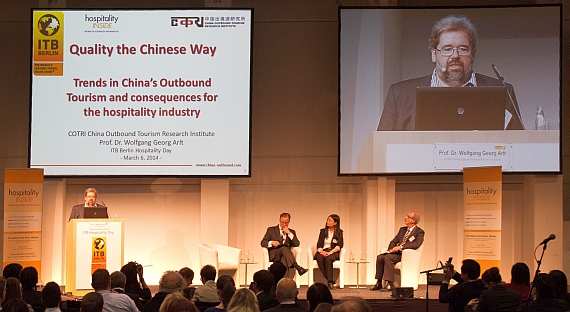ITB Hospitality Day 2014 revealed changes in Chinese travel behaviour
 |
|
| The "new Chinese" attract many visitors at the hotel conference at ITB 2014, the "ITB Hospitality Day". Moderator Professor Wolfgang Arlt leads to the topic. / photos: ostwestfoto |
Berlin (March 28, 2014). "Travel was always an important part of Chinese life," the Director of China Outbound Tourism Research Institute, Wolfgang Georg Arlt, said at the start of the Chinese talk round at the 9th "ITB Hospitality Day" in Berlin. Yet it wasn't until 2013 that the Chinese government began to actively support outbound travel. Whereas travel in the past was primarily within China, cross-border travel has meanwhile revealed enormous growth. At the same time, expenditure by travellers has also increased. "The average age of the Chinese millionaire is 39 years old, in Germany it's 55", Arlt reports. This means: Even young travellers often have a lot of money at their disposal. The typical Chinese tourist is now a thing of the past though. Wolfgang Arlt enticed many details from his guests on the stage at the hotel conference, in particular about the behavioural changes of Chinese travellers.
Arlt has currently identified four types of Chinese traveller: the price-conscious package traveller, the individual traveller (this type of traveller accounts for around a third of the market), consumption-oriented business travellers and travel-experienced Chinese ex-pats as well as student travellers. "Give the Chinese quality as they want it!" he told hoteliers. "The rules in this game will change again," Arlt claims, as a result of the upcoming relaxation of visa requirements.
For the five percent of upper society, travel isn't a holiday but - aside from business travel - is an investment in prestige and education. Around 50 million experienced Chinese travellers plan repeat journeys, whilst 100 million from China's second and third cities are still planning their first trip outside China's borders. Those making their first trip focus on shopping and tourist attractions, those who have already left China prefer lifestyle (in place of brands) and experience (in place of monuments). In China itself, luxury purchases halved in 2013 - itself an indication that these purchases are increasingly being made abroad.
 |
|
| Yufei Gu, Caissa: Young Chinese don't like instant noodle soup. |
Turn the lack of time into extra revenue with more service
"Chinese guests expect a return on investment in their travel," Arlt goes on. This is true both in terms of the services they expect as well as for the time they invest. From the Chinese perspective, quality is very important. "The programmes introduced by the hotel chains Hilton, Marriott and IHG specially for Chinese guests are outdated," the expert said. "Not all Chinese fear the number 4 or like to have instant noodles in their rooms. They don't all want to play mah-jong or practise shadowboxing, and they do drink alcohol." Hotels wishing to offer Chinese television programmes should also offer real Chinese television and not merely English-speaking Chinese broadcasters.
Arlt's basic advice to the hotel industry is to focus more on direct booking channels for China-incoming and to provide guests with as many additional services as possible. "The Chinese have money, but they don't have time. Don't let them wait!" In demand are F&B arrangements, shopping tours, entertainment programmes, a concierge service... Honeymooners, who particularly like to come to Europe, would be just as pleased with an organised Chinese-speaking photographer as parents looking for universities for their children would be with a pre-arranged contact to higher-education. Such extra-services can also mean extra-money for a hotel.
The new Chinese individual guests are also increasingly travelling in families or with friends which is why flexible room arrangements for small groups should also be made available. Public areas and lounges are often more important that the rooms themselves. Information should also always be provided in Chinese. "The hotel should itself be the destination as a result of its offering," Arlt says.
Ice-hotel instead of kettle
Yufei Gu, Manager of Hotel Procurement at Caissa Touristic Group in Hamburg, provided the viewpoint from a Chinese tour operator, one that last year celebrated its 20th anniversary. Yufei Gu confirmed that the number of Chinese individual tourists between 25 and 40 years of age has increased sharply. They have studied abroad and Europe and the US for them are no longer foreign countries. Moreover, they also know a lot from the Internet. What they expect of their travel destinations is further information about the region and lots of local experiences from the destination.
 |
|
| Darren Gearing, Shangri- La: Give the guests a personal welcome at the airport! |
"The new guests are very much interested in gaining a deeper understanding and experience. The days of the tour through eight countries in ten days with a short photo stop are on the wane," Gu says. "Our hotels are selected by price and location with attention also paid to the particular offering of the hotel. Whereas we previously asked about the kettle and Chinese food, today we are interested in special experiences such as those offered by design hotels or the ice-hotel in Sweden. A hotel can also be a destination and tell a story." The Internet serves as a source for preparation which is why the time schedules of the experienced and individual traveller are becoming increasingly exact; hotels which are off the beaten track are no longer being booked, instead rich young Chinese are choosing their hotel by distance to the city centre or to the next metro station. For them, the metro experience counts, despite their ability to pay for a taxi.
You see young Chinese guests sitting with their smartphones in hotel lobbies: They all love social media, are constantly uploading photos, tweeting and sharing their travel experiences with friends back home. This is how Yufei Gu describes the new travel focus. For the hotelier this means: his hotel, his brand, his chain must also be represented in social media!
Horse racing in England and football in Spain
Darren Gearing, Regional Vice President Europe of Shangri-La Hotels & Resorts and also General Manager at the Shangri-La London at the Shard (opened at the beginning of May), showed himself to be best informed with regard to Chinese travel habits. "We stand at the beginning of a trend," he says: In China, 35 new airports have recently opened, international flight connections are rising rapidly, private jets are booming. More and more people are earning larger sums of money and are travelling. On Chinese holidays, millions of people set out on trips...
"Their booking channels are changing each month," Gearing said. "Sometimes the guests book directly, sometimes through OTAs such as booking.com. Sometimes they travel with friends, sometimes with children."
A minimum standard for a Chinese-friendly hotel is a Mandarin-speaking member of staff, a Chinese breakfast and Chinese menus. The main target group from China in his hotel in London are smaller groups and couples. "In Great Britain, they love to watch horse racing," Gearing says. In France, a visit to a Champagne cellar would probably score highly. After all, there are meanwhile numerous wine cellars in China.
"If Chinese HNWIs book with us, we send one of our own employees to the airport to pick them up. An external chauffer who simply holds up a nameplate is not enough." Expectations of hotel standards are high and based on the many handsome brand new hotels with 45 sq.m. rooms in China. Chinese guests expect six TV channels and up to twelve types of tea, all served in the original Chinese style.
And even the Shangri-La Manager advised hotel groups not to forget marketing in China. Gearing repeated Yufei Gu's observation: Social media are important and the Chinese also love bloggers, some of which have up to 25 million followers.
 |
|
| Luis del Olmo, Meliá Hotels: It's only about culture and language. |
The Chinese are more progressive and a model for Europeans
Luis del Olmo, Executive Vice President Asia Pacific of Spain's Meliá Hotels, described what it meant to underestimate the mega Chinese market. For a long time, Melia had just one hotel in Bali, then four years ago, the company ventured an expansion through joint ventures with national partners (Yin Yang and Greenland). "Our learning curve was steep," the Spanish manager admitted. Today, Meliá has 14 hotels in operation and a pipeline for around 30 destinations in China, including secondary cities which are larger than Barcelona.
Del Olmo monitors not only the expansion in the Asian Pacific, but also trains members of staff. "There is no difference between the Spaniard in China and the Chinese in Spain," he says. Everything is always a matter of culture and language. "No matter where you're from in China, there is English signage and information everywhere as well as people willing to help who speak English," del Olmo describes of the Chinese, who he sees as much more progressive than the Europeans. Western countries should therefore also make an effort to tap into Chinese culture in a similar way. In Barcelona, for example, Chinese guests would be very interested to go to a football game.
There was just one difference to be made out between the statements of the Caissa representative and the established hotel manager: Hotel groups often hold to "old" standards in which younger travellers are no longer interested.
The potential offered by the Chinese travel market is enormous for all concerned, as became clear in the closing questions and answers with the ITB audience: For the time being, all experts agree, Chinese guests are most often found in 4-star hotels (in large groups) or in luxury hotels (in small groups and couples). With growing intensity of travel, experienced younger Chinese guests are in future also more likely to consider budget hotels and B&Bs. Above all, the latter of these embodies local culture and authenticity. / Susanne Stauss
Continuative Links:
- March 21, 2014 A concept, both useful and detrimental - ITB Hospitality Day: Private room sellers and hotels exchange arguments
- March 14, 2014 Dancing in front of the solar cells - ITB Hospitality Day 2014: Luxury and sustainability challenge each other
To print this article you have to be registered and logged in for newsletter, visitor or subscription.





